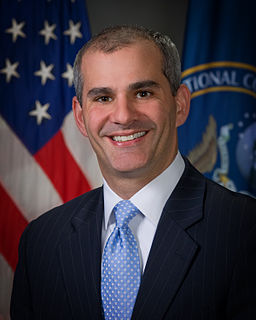A Quote by Michael Leiter
I think the refugee problem is Europe is vastly worse than we have in the United States.
Related Quotes
In Europe, you have very different situation than you do in the United States. In Europe, it's very segregated. And you have the diasporas in Belgium that I saw. And they're being radicalized because they're not assimilated with the culture. I don't think we have that same situation in the United States.
Unemployment is higher in Europe than in the United States and primarily concentrated in immigrant minority populations, so people are worried about what's going to happen and if American-style ghettos are emerging in Europe. There are some of the problems there that America sees associated with the lack of economic inclusion - family breakdown, gang behavior, and racial tensions. I get the sense that in Europe they are much more concerned about these issues than in the United States.
Hopefully, whether it's energy or child vaccines, the case of the many benefits helping countries so that they are stable, so these refugee problems that have been troubling for Europe - a little less so for the U.S. but, even so, a lot of controversy there - these things are why the future's going to be better than the past. People really do look to the United States, so we'll be there making the case.
That was the reason why very few people fleeing the rise of fascism in Europe, especially in Germany, could get to the United States. And there were famous incidents like with the MS Saint Louis, which brought a lot of immigrants, mostly Jewish, from Europe. It reached Cuba, with people expecting to be admitted to the United States from there. But the administration of Franklin D. Roosevelt wouldn't allow them in and they had to go back to Europe where many of them died in concentration camps.
































